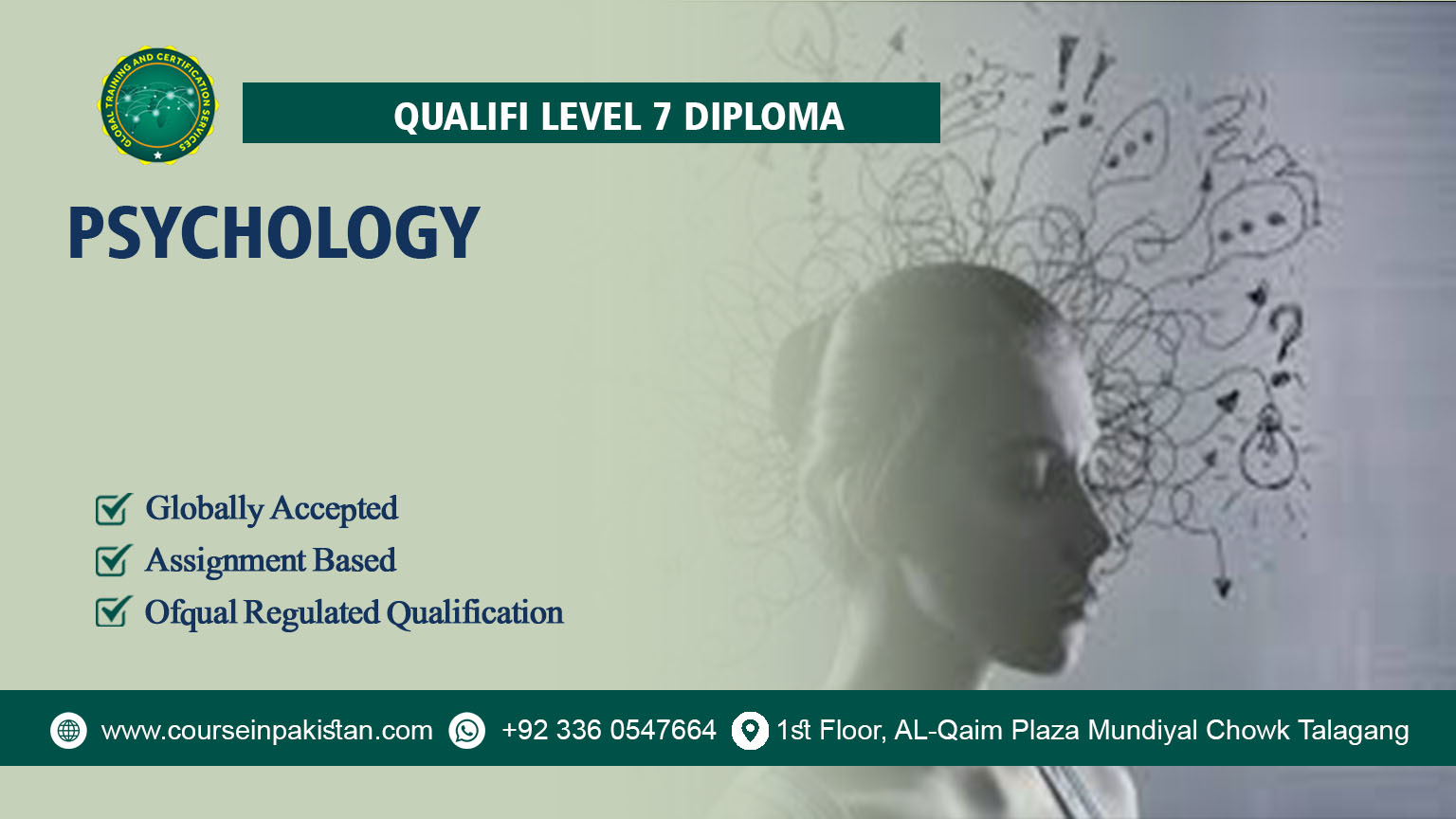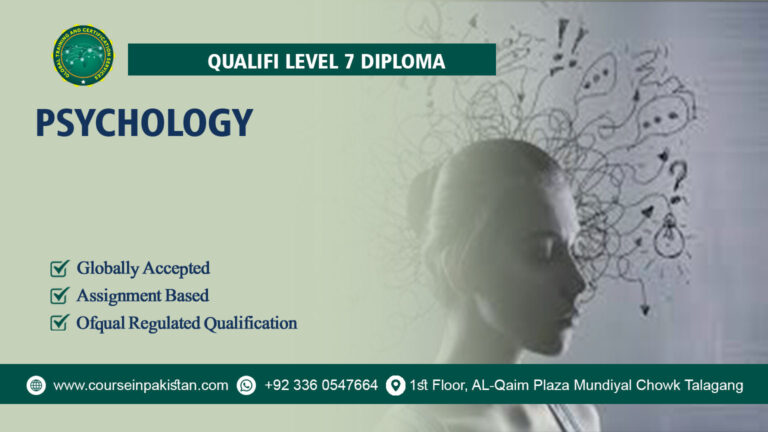
Qualifi Level 5 Extended Diploma in Psychology
Exploring the depths of human cognition, behavior, and mental processes, the Qualifi Level 5 Extended Diploma in Psychology offers an expansive journey into the field of psychology. Designed for those eager to deepen their knowledge and expertise, this diploma provides a comprehensive framework for professional growth and specialization in various psychological disciplines.
The Qualifi Level 5 Extended Diploma in Psychology is crafted to immerse participants in advanced psychological theories, research methodologies, and practical applications. It builds upon foundational knowledge acquired at lower levels, aiming to cultivate critical thinking, analytical skills, and ethical awareness essential for effective practice in psychology-related fields.
This diploma encompasses a diverse array of advanced topics essential for comprehensive study in psychology. Participants engage with cutting-edge theories, research findings, and practical techniques across areas such as cognitive psychology, developmental psychology, social psychology, psychopathology, research methods, and therapeutic interventions. The curriculum is structured to integrate theoretical understanding with hands-on experience, preparing learners to apply psychological principles in real-world contexts.
Course Benefits
- Advanced Knowledge: Gain in-depth understanding of advanced psychological theories, principles, and methodologies.
- Critical Thinking: Develop analytical and critical thinking skills to evaluate psychological research and theories.
- Professional Skills: Acquire practical skills in research design, data analysis, and application of psychological principles.
- Career Advancement: Enhance employability in psychology-related fields such as counseling, therapy, research, education, and human resources.
- Preparation for Further Study: Lay a solid foundation for pursuing higher education and specialization in psychology or related disciplines.
Course Study Units
The Qualifi Level 5 Extended Diploma in Psychology typically includes advanced study units such as:
The Scope of Psychology
Social And Developmental Psychology
Biopsychology
The Development of Psychological Attachments
Processes Of Human Memory
Research Methods and Investigating Psychology
Psychological Approaches to Depression and Schizophrenia
Visual Perception in a Psychological Context
Social Psychology: Pro and Anti-Social Behaviour
The Diversity of Addiction
Individual Differences: Intelligence, Personality and Criminology
Contemporary Issues and Debates in Psychology
Learning Outcomes
Upon completion of the diploma, participants can expect to achieve the following learning outcomes:
-
The Scope of Psychology
Learning Outcomes:
- Comprehensive Understanding: Gain a broad understanding of the scope, history, and major subfields of psychology.
- Key Concepts: Identify and explain key concepts and theoretical perspectives that define modern psychology.
- Application: Apply psychological principles to analyze and interpret human behavior and mental processes across different contexts.
- Integration: Integrate knowledge of various psychological perspectives to address complex psychological phenomena and issues.
2. Social And Developmental Psychology
Learning Outcomes:
- Social Influences: Understand how social factors influence individual behavior, attitudes, and development throughout the lifespan.
- Developmental Stages: Describe and evaluate theories of human development, including cognitive, emotional, and social aspects.
- Impact of Environment: Analyze the role of social and environmental factors in shaping personality and social interactions.
- Intervention Strategies: Propose interventions and strategies to promote healthy social development and behavior.
3. Biopsychology
Learning Outcomes:
- Neurobiological Basis: Explore the relationship between brain structure, function, and behavior.
- Biological Processes: Understand how genetics, hormones, and neurotransmitters influence psychological processes and behavior.
- Health Implications: Analyze the impact of biological factors on mental health, cognition, and emotional regulation.
- Integration: Integrate biological and psychological perspectives to explain complex human behaviors and mental disorders.
4. The Development of Psychological Attachments
Learning Outcomes:
- Attachment Theory: Understand the principles of attachment theory and its significance in emotional development and relationships.
- Impact of Relationships: Evaluate how early attachments influence social and emotional development across the lifespan.
- Intervention and Support: Propose strategies to support healthy attachments and address attachment-related issues in therapeutic settings.
- Application: Apply attachment theory concepts to real-world scenarios in caregiving, therapy, and social services.
5. Processes Of Human Memory
Learning Outcomes:
- Memory Systems: Describe and evaluate the different types and processes of human memory, including encoding, storage, and retrieval.
- Factors Affecting Memory: Analyze how factors such as attention, emotions, and aging influence memory performance.
- Memory Disorders: Identify common memory disorders and their impact on daily functioning and quality of life.
- Memory Enhancement: Recommend strategies to improve memory retention and retrieval based on cognitive psychology principles.
6. Research Methods and Investigating Psychology
Learning Outcomes:
- Research Design: Design and implement research studies using appropriate methodologies and techniques in psychology.
- Data Collection: Apply quantitative and qualitative methods to collect and analyze psychological data.
- Ethical Considerations: Adhere to ethical guidelines and principles in conducting psychological research involving human participants.
- Critical Evaluation: Critically evaluate research literature and findings to inform evidence-based practice and decision-making in psychology.
7. Psychological Approaches to Depression and Schizophrenia
Learning Outcomes:
- Understanding Disorders: Develop an advanced understanding of psychological theories and approaches to depression and schizophrenia.
- Therapeutic Interventions: Evaluate and compare psychological interventions and treatments for depression and schizophrenia.
- Impact on Individuals: Analyze the psychological, social, and personal impact of living with depression and schizophrenia.
- Research Integration: Integrate psychological research findings to inform effective treatment approaches and support strategies.
8. Visual Perception in a Psychological Context
Learning Outcomes:
- Perceptual Processes: Explain the principles and mechanisms involved in visual perception from a psychological perspective.
- Sensory Mechanisms: Understand how sensory mechanisms and cognitive processes contribute to visual perception.
- Perceptual Illusions: Analyze perceptual illusions and phenomena to explore the limitations and complexities of visual perception.
- Application: Apply knowledge of visual perception to practical applications such as design, advertising, and virtual reality.
9. Social Psychology: Pro and Anti-Social Behaviour
Learning Outcomes:
- Social Dynamics: Examine social influences on pro-social and anti-social behavior within different contexts.
- Group Dynamics: Analyze group behavior, conformity, obedience, and leadership from a social psychology perspective.
- Intervention Strategies: Propose strategies and interventions to promote pro-social behavior and reduce anti-social behavior.
- Ethical Considerations: Discuss ethical implications of social psychological research and applications related to behavior modification.
10. The Diversity of Addiction
Learning Outcomes:
- Types and Causes: Identify and classify different types of addiction and their psychological and environmental causes.
- Risk Factors: Evaluate psychological and social risk factors associated with addiction development and maintenance.
- Treatment Approaches: Discuss psychological interventions and treatment modalities for addiction, including harm reduction strategies.
- Public Health Impact: Analyze the impact of addiction on individuals, families, and communities from a psychological and public health perspective.
11. Individual Differences: Intelligence, Personality and Criminology
Learning Outcomes:
- Intelligence Studies: Understand psychological theories and research on intelligence, including measurement and factors influencing intelligence.
- Personality Theories: Evaluate major personality theories and their application in understanding individual differences and behavior.
- Criminological Perspectives: Analyze psychological theories of crime, criminal behavior, and rehabilitative approaches within criminology.
- Assessment Techniques: Critically assess methods and techniques used to measure intelligence, personality traits, and criminological variables.
12. Contemporary Issues and Debates in Psychology
Learning Outcomes:
- Current Debates: Engage with contemporary debates and issues in psychology, such as ethical considerations, technological advancements, and cultural influences.
- Critical Evaluation: Critically evaluate conflicting perspectives and evidence on contemporary issues in psychology.
- Research and Practice: Apply critical thinking skills to analyze how contemporary issues impact psychological research, practice, and policy.
- Ethical Awareness: Consider ethical implications and dilemmas related to emerging trends and debates in psychology.
These comprehensive learning outcomes equip graduates of the Qualifi Level 5 Extended Diploma in Psychology with advanced knowledge, critical thinking abilities, and practical skills essential for success in diverse careers within psychology and related fields. This diploma serves as a stepping stone for further academic pursuits or entry into professional roles where an advanced understanding of human behavior and psychological processes is required.
Who is This Course For?
The Qualifi Level 5 Extended Diploma in Psychology is ideal for:
- Psychology Graduates: Graduates seeking to deepen their knowledge and skills in preparation for professional roles or further study.
- Career Changers: Professionals transitioning into psychology-related fields seeking formal education and accreditation.
- Aspiring Researchers: Individuals interested in conducting psychological research and contributing to the advancement of psychological knowledge.
- Personal Development Enthusiasts: Individuals passionate about understanding human behavior and mental processes for personal growth and enrichment.
Future Progression
Graduates of the Qualifi Level 5 Extended Diploma in Psychology have diverse pathways for career advancement and further study:
- Bachelor’s Degree: Progress to a bachelor’s degree program in psychology or related fields to specialize in specific areas such as clinical psychology, counseling, or neuropsychology.
- Professional Practice: Enter entry-level positions in counseling, therapy, mental health support, educational psychology, or social services.
- Research and Academia: Pursue roles in psychological research, academia, or educational institutions as research assistants or educators.
- Specialist Training: Undertake further training or certifications in specialized therapeutic approaches, counseling techniques, or psychological assessments.
The Qualifi Level 5 Extended Diploma in Psychology offers a transformative educational experience for individuals passionate about psychology and committed to making a difference in people’s lives. Whether you aspire to work in clinical settings, research institutions, educational environments, or community services, this diploma equips you with the knowledge, skills, and ethical grounding needed to excel in diverse psychological professions. Embrace the opportunity to expand your horizons, contribute to advancing psychological knowledge, and embark on a fulfilling career dedicated to understanding and improving human well-being through the lens of psychology.






